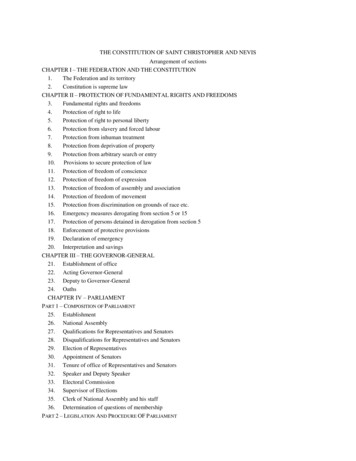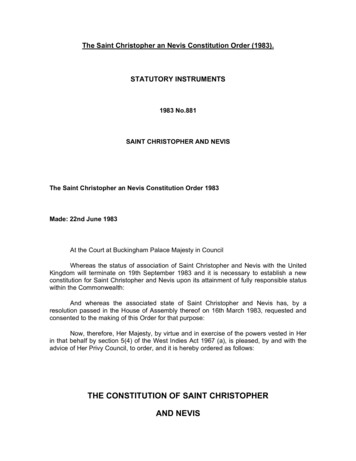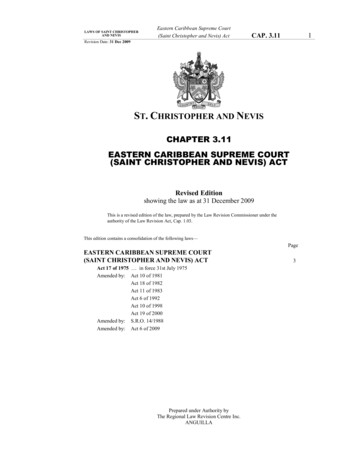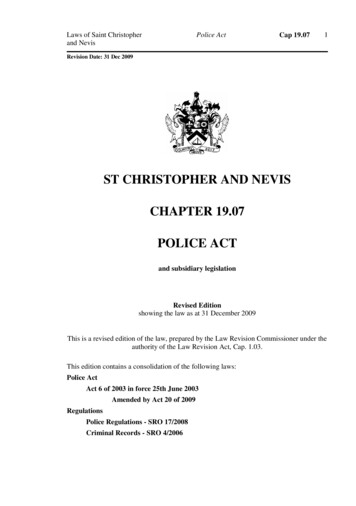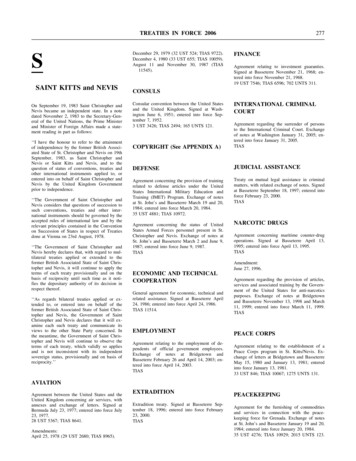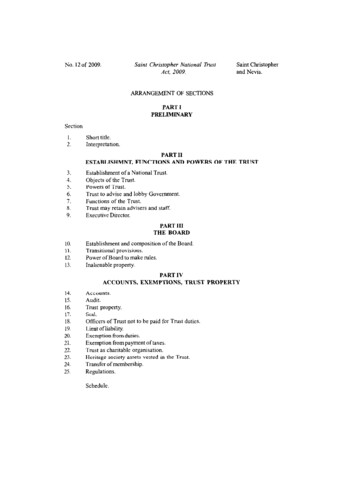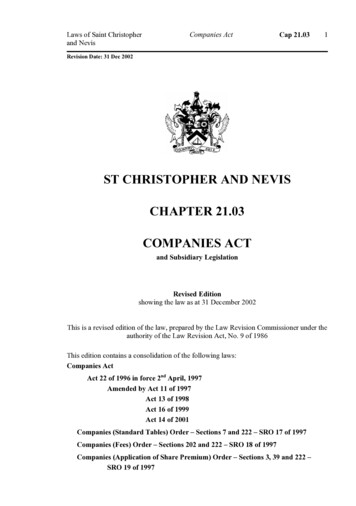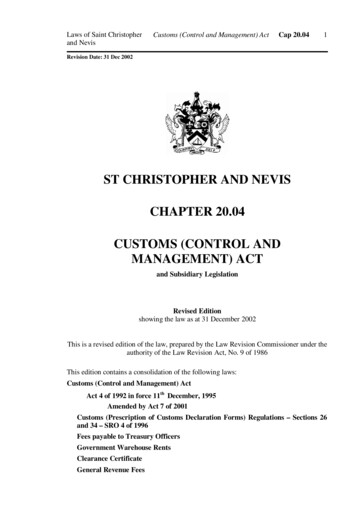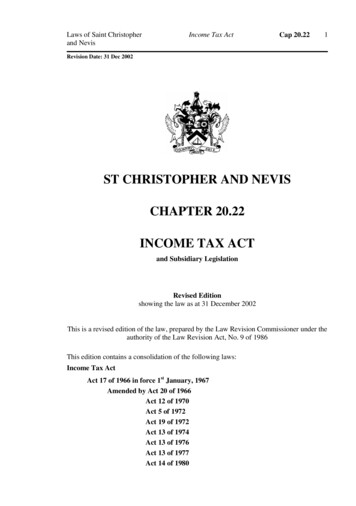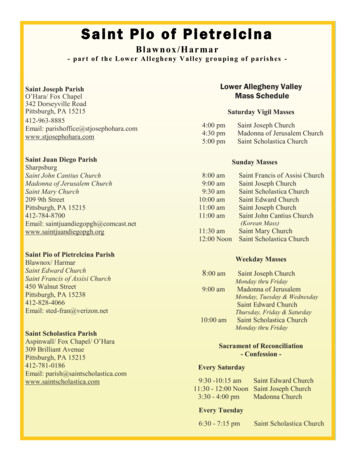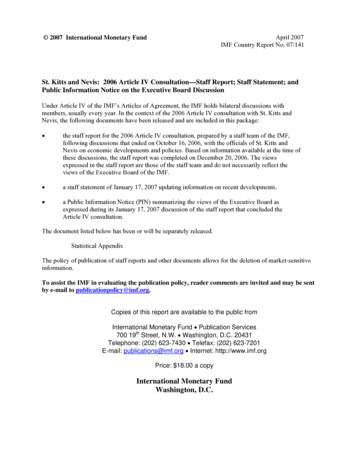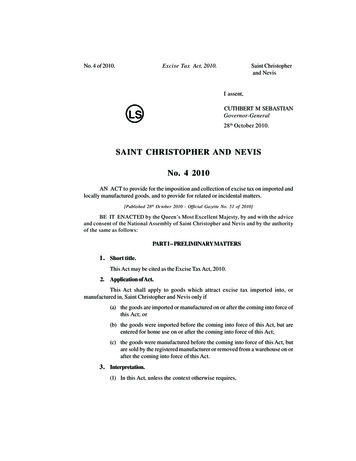
Transcription
1No. 4 of 2010.Saint Christopherand NevisExciseTaxTaxAct,Act,2010– 4.Excise2010.I assent,CUTHBERT M SEBASTIANGovernor-GeneralLS28 th October 2010.SAINT CHRISTOPHER AND NEVISNo. 4 2010AN ACT to provide for the imposition and collection of excise tax on imported andlocally manufactured goods, and to provide for related or incidental matters.[Published 28th October 2010 - Official Gazette No. 51 of 2010]BE IT ENACTED by the Queen’s Most Excellent Majesty, by and with the adviceand consent of the National Assembly of Saint Christopher and Nevis and by the authorityof the same as follows:PART I – PRELIMINARY MATTERS1. Short title.This Act may be cited as the Excise Tax Act, 2010.2. Application of Act.This Act shall apply to goods which attract excise tax imported into, ormanufactured in, Saint Christopher and Nevis only if(a) the goods are imported or manufactured on or after the coming into force ofthis Act; or(b) the goods were imported before the coming into force of this Act, but areentered for home use on or after the coming into force of this Act;(c) the goods were manufactured before the coming into force of this Act, butare sold by the registered manufacturer or removed from a warehouse on orafter the coming into force of this Act.3. Interpretation.(1) In this Act, unless the context otherwise requires,
2Excise Tax Act, 2010 – 4.“applicant” means a person who makes an application pursuant to theprovisions of section 10;“approved form” means a form approved, in writing, by the Comptroller orthe Comptroller of Customs;“approved warehouse” means a place approved as a warehouse by theComptroller pursuant to the provisions of section 12.(1);“Comptroller” means the Comptroller of Inland Revenue;“Comptroller of Customs” means the person for the time being performingthe duties of Comptroller of Customs of the State and includes anyCustoms Officer;“consideration”, in relation to a supply or importation of goods, includes(a) the total amount in money or kind paid or payable;(b) a deposit on a returnable container for the supply or importation ofgoods by any person, directly or indirectly; and(c) duties, levies, fees, and charges, other than tax payable under thisAct paid or payable on, or by reason of, the supply or importationof goods;reduced by any price discounts or rebates allowed and accounted forat the time of the supply or import of the goods, but does not include:(i) a cash payment made by any person as an unconditional giftto an association not for gain; or(ii) a deposit, other than a deposit on a returnable container,whether refundable or not, given in connection with a supplyof goods unless the supplier applies the deposit asconsideration for the supply or such deposit is forfeited;“entered”, in relation to(a) an import or export of goods, has the meaning assigned to it underthe Customs (Control and Management) Act, Cap. 20.04; and(b) a removal of goods manufactured in Saint Christopher and Nevis,means the removal of the goods for home use from an approvedwarehouse;“entered for export” means entered for export in accordance with therequirements of the Customs (Control and Management) Act;“entered for home use”, in relation to(a) goods which are imported into the Federation and do attract excisetax, means
3Excise Tax Act, 2010 – 4.(i) an entry of goods for home use under the customs laws; or(ii) if no such entry is made, an importation of goods which aredeemed, under this Act or the Customs laws, to have beenentered for home use; and(b) goods which are manufactured in Saint Christopher and Nevis anddo attract excise tax, the first removal, other than a removal referredto in section 12.(1)(b), of those goods from a warehouse;“excise tax” means tax imposed under section 16, and any amount requiredto be brought to account as excise tax by virtue of the provisions ofthis Act;“exempt goods” mean goods which are not liable to excise tax and whichgoods are specified in the Second Schedule to this Act or otherwiseunder this Act;“export” means to take or cause to be taken out of Saint Christopher andNevis or the territorial sea;“fair market value” has the meaning assigned to it by section 4 of this Act;“home use” means consumption, use, or application in Saint Christopherand Nevis;“import” means to bring or cause to be brought into Saint Christopher andNevis or the territorial sea;“importer”, in relation to any goods at any time between their importationand the time when they are delivered out of customs charge, includesany owner or other person for the time being possessed of or beneficiallyinterested in the goods;“import duty” means a duty of customs chargeable under any law on goodson importation;“manufacture” includes(a) making or producing goods that are subject to excise tax,:(b) all processes, intermediate or incomplete processes, undertaken inmaking or producing the goods;(c) filtering, diluting, or blending goods that are subject to excise taxwith other goods, (including other goods that are subject to excisetax);(d) putting goods that are subject to excise tax, for the first time, intoa container in which they may be presented for sale, or from whichthey may be dispensed; and(d) labelling or marking, for the first time, containers filled with goodsthat are subject to excise tax;
4Excise Tax Act, 2010 – 4.“manufacturer” includes a person who manufactures goods that are subjectto excise tax;“Minister” means the Minister responsible for the subject of Finance;“officer” means an officer who is authorised by the Comptroller orComptroller of Customs to carry out the functions or duties of an officerunder this Act;“person” includes the Federal Government, an agency of the FederalGovernment, the Nevis Island Administration, an agency of the NevisIsland Administration, a trust, a company, and a partnership;“premises” include(a) a place, whether or not that place is enclosed or built on;(b) a structure, vehicle, vessel, or an aircraft;“registered manufacturer” means a person who is registered pursuant tothe provisions of section 12;“related persons” mean(a) a natural person and a relative of that natural person;(b) a trust and a person who is or may be a beneficiary in respect ofthat trust or whose relative is or may be a beneficiary;(c) a partnership or company limited by shares and a member thereofwho, together with shares or other membership interests held bypersons who are related to such member under another paragraphof this definition, owns 25% or more of the rights to income orcapital of the partnership or company;(d) a shareholder in a company limited by shares if the shareholder,together with shares held by persons who are related to suchshareholder under another paragraph of this definition(i) controls 25% or more of the voting power in the companylimited by shares; or(ii) owns 25% or more of the rights to dividends or of the rightsto capital; or(e) two companies, if a person, either alone or together with aperson or persons who are related to such person under anotherparagraph of this definition(i) controls 25% or more of the voting power in bothcompanies; or(ii) owns 25% or more of the rights to dividends or of the rightsto capital in both companies; and
5Excise Tax Act, 2010 – 4.for purposes of paragraphs (c), (d), and (e) of this definition, a personshall be treated as owning, on a pro rata basis, shares or othermembership interests which are owned or controlled by such personindirectly through one or more interposed persons;“sale” means(a) an agreement;(b) barter transaction; or(c) any other transaction;under which ownership of goods, or the right to dispose of the goodsas owner, passes or is intended to pass from one person to anotherperson for consideration;“tax fraction”, in relation to goods that are subject to tax under this Act,means the fraction calculated in accordance with the formula R/(1 R)where “R” is the rate of excise tax applicable to the goods;“tax period” has the meaning assigned to it by section 22;“warehouse” means a place for the depositing, keeping, manufacturing, orsecuring of goods that are subject to tax under this Act.(2) For the purposes of this Act, the classification and description of goodsspecified in the First Schedule shall be interpreted in accordance with the rules ofinterpretation set out in the Harmonised System.(3) For the purposes of this Act, all goods that attract excise tax and aremanufactured in Saint Christopher and Nevis by a registered manufacturer shall be deemedto be goods manufactured and entered for home use.(4) For the purposes of this Act, all goods which attract excise tax found in awarehouse shall be deemed to have been manufactured in such warehouse.4.Definition of fair market value.(1) For the purposes of this Act, the fair market value of an importation ofgoods at a given date is the consideration in money which the importation would generallyfetch if imported in similar circumstances at that date in Saint Christopher and Nevis, beingan importation freely offered and made between persons who are not related persons.(2) Where the fair market value of an importation of goods at a given datecannot be determined under subsection (1), the fair market value is the consideration inmoney which a similar importation would generally fetch if imported in similar circumstancesat that date in Saint Christopher and Nevis, being an importation freely offered and madebetween persons who are not related persons.(3) Where the fair market value of an importation of goods cannot be determinedunder subsection (1) or (2), the fair market value shall be determined in accordance with any
6Excise Tax Act, 2010 – 4.method approved by the Comptroller, which method shall provide a sufficiently objectiveapproximation of the consideration in money which could be obtained for that importationhad the importation been freely offered and made between persons who are not relatedpersons.(4) The fair market value of an importation shall be determined at the time of theimportation as determined in this Act.(5) In this section, “similar importation”, in relation to goods, means goodsproduced in the same country which, although not alike in all respects, have thecharacteristics and like component materials which enable them to perform the same functionsand to be commercially interchangeable.5. Goods manufactured in Saint Christopher and Nevis deemed to be goodsmanufactured for home use etc.(1) Goods which are subject to tax under this Act and are manufactured inSaint Christopher and Nevis shall, for the purposes of this Act, be deemed to be goodsmanufactured and entered for home use.(2) Goods which are subject to tax under this Act which are found in a warehousethat belongs to a registered manufacturer shall be deemed to be goods manufactured bysuch registered manufacturer.PART II – ADMINISTRATION6. Duties of Comptroller.(1) Subject to this Act, the Comptroller shall be responsible for the generalimplementation and enforcement of the provisions of this Act.(2) The Comptroller may, in relation to any matter or class of matter, delegate, toa taxation officer, or any other person who is employed for the purpose of assisting incarrying out the provisions of this Act, any duty, function, or power conferred upon theComptroller by this Act, other than(a) the power of delegation conferred by this subsection; and(b) the power to sanction prosecution conferred by section 63.(3) A delegation made pursuant to the provisions of subsection (2) may berevoked at any time by the Comptroller, and such delegation shall not, during the time it isin force, prevent the Comptroller himself or herself from exercising such duties, functions orpowers.(4) Subject to subsections (5) and (6), a decision made and a notice orcommunication issued or signed by the Comptroller or his or her delegatee may be withdrawnor amended at any time.(5) Where the Comptroller, knowing all the material facts at the time, makes adecision that a person is required to or not required to register, and the person accepts the
7Excise Tax Act, 2010 – 4.Comptroller’s decision, and subsequently the Comptroller withdraws his or her decision,then the Comptroller’s earlier decision shall govern the liability or non-liability of the personin respect of the payment of tax on any transaction concluded or event which occurredbefore the withdrawal of the decision.(6) Where the Comptroller, knowing all the material facts at the time, makes adecision as to the nature of the transaction concluded by a person, and the person acceptsthe Comptroller’s decision, and subsequently the Comptroller withdraws his or her decision,then the Comptroller’s decision shall govern the liability or non-liability of the person inrespect of the payment of tax on any transaction concluded before the withdrawal of thedecision.7.Secrecy.(1) Subject to the provisions of this section, a taxation officer or other personcarrying out the provisions of this Act shall not(a) disclose to any other person any matter in respect of any other person,which matter may come to their knowledge during the exercise of theirduties, functions and powers under the provisions of this Act; or(b) permit any person to have access to any records in the possession ofthe Comptroller, except in the course of the exercise of their duties,functions or powers under the provisions of this Act or by an order ofa court.(2) Nothing in this section shall prevent the Comptroller from disclosing(a) any documents or information to(i) a person where the disclosure is necessary for the purposes ofthis Act or any other law in force in Saint Christopher and Neviswhich the Comptroller or the Comptroller of Customs has the power,duty or function to administer;(ii) a person authorized by any enactment to receive such information;or(iii) the competent authority of the Government of another countrywith which Saint Christopher and Nevis has entered into anagreement for the avoidance of double taxation or for the exchangeof information, to the extent permitted under the agreement or anylaw in force in saint Christopher and Nevis; or(b) information which does not identify a specific person to a person in theservice of Saint Christopher and Nevis in a revenue or statisticaldepartment where such disclosure is necessary for the performance ofthe person’s official duties.
8Excise Tax Act, 2010 – 4.(3) A person who receives any document or information pursuant to theprovisions of subsection (2) shall keep the document or information secret until the purposefor which the disclosure was made is achieved.(4) Documents or information obtained by the Comptroller in the performanceof his or her duties under this Act may be used by the Comptroller for the purposes of anyother law administered by the Minister, Comptroller or the Comptroller of Customs.(5) If a person consents, in writing, information regarding that person may bedisclosed to another person.(6) The Comptroller may disclose information concerning a taxpayer’s affairsto a person claiming to be the taxpayer or the taxpayer’s authorized representative only afterobtaining reasonable assurance of the authenticity of the claim.(7) Nothing in this section shall prevent the Comptroller and the Comptroller ofCustoms from exchanging information in order to perform their duties under any enactmentin force in Saint Christopher and Nevis that they administer.(8) The obligation as to secrecy imposed by this section shall continue toapply in respect of any person even if that person ceases to have any official duty underthis Act, or to be employed in carrying out the provisions of this Act.(9) A person who contravenes this section commits an offence and shall beliable, on summary conviction, to a fine not exceeding twenty thousand dollars or toimprisonment for a term not exceeding one year or both.8.Collection of tax on imported goods.(1) The Comptroller of Customs shall, on behalf of the Comptroller, beresponsible for the collection of the tax imposed on imported goods by the provisionsof this Act.(2) Tax on imported goods shall be charged and payable under this Act, but, forthe purposes of collecting and enforcing the payment of this tax, the Customs (Control andManagement) Act, Cap. 20.04 shall apply with the necessary modifications or changes inthe same manner as if the collection and enforcement of the payment of the tax were a dutyof customs.(3) The Comptroller of Customs may, by virtue of the provisions ofsubsection (4), exercise any power conferred on the Comptroller of Customs by any customslegislation as if the reference to duty in that legislation included a reference to tax chargedon imported and exported goods under this Act.(4) Unless a contrary intention appears, the provisions of the Customs (Controland Management) Act relating to the importation, transit, coastwise carriage, clearance ofgoods, and payment and recovery of duty apply, so far as relevant, to the tax charged underthis Act on the imported goods, with such exceptions, modifications, and adaptations asthe Minister may, by regulations made under this Act, prescribe.
9Excise Tax Act, 2010 – 4.9.Import declaration and payment of tax on imported goods.(1) The Comptroller of Customs(a) shall, on behalf of the Comptroller, collect, at the time of importationof any goods, any tax due under this Act on the imported goods;(b) shall, at the time of collection of the tax, obtain the name and thetaxpayer’s identification number, if any, of the importer, the importdeclaration, and the invoice values in respect of the imported goods;and(c) may make arrangements with the Postmaster General to perform, onbehalf of the Comptroller of Customs, functions in respect of thecollection of tax on imported goods that arrive through the postalservices.(2) Where tax is payable on any imported goods, the importer shall, upon theentry of the goods, furnish the Comptroller of Customs with an import declaration and paythe tax due on the imported goods in accordance with the arrangements referred to insection 8.(4).(3) An import declaration referred to in subsection (2) shall(a) be in the form prescribed by the Comptroller of Customs;(b) contain the information necessary to calculate the tax payable in respectof the imported goods; and(c) be furnished in the manner prescribed by the Comptroller of Customs.PART III – REGISTRATION OF TAX PAYERS10 Criteria for registration.(1) A person who meets the threshold requirements provided in subsection (2)shall not, within Saint Christopher and Nevis, manufacture goods which are subject to taxunder this Act unless(a) that person holds a registration certificate issued by the Comptroller inaccordance with the provisions of this Act;(b) that person has entered into a security arrangement with the Comptrollerpursuant to the provisions of this Act; and(c) the warehouse in which the person manufactures such goods havebeen approved as premises in which goods may be manufacturedpursuant to the provisions of the relevant law.(2) A person who carries on the business of manufacturing goods which aresubject to tax under this Act shall apply to the Comptroller to be registered as a manufacturerfor the purposes of this Act within fourteen calendar days of
10Excise Tax Act, 2010 – 4.(a) the end of any period of twelve or fewer months where, during thatperiod, the manufacturer’s receipts from the sale of the goods exceeded 20,000;(b) the beginning of any period of 365 calendar days where there arereasonable grounds to expect that the manufacturer’s receipts duringthat period from the sale of the goods will exceed 20,000; or(c) the end of any three months period during which the manufacturer’sreceipts from the sale of the goods exceeded 5,000 and there arereasonable grounds to expect that the manufacturer’s total receiptsfrom the sale of the goods during that period and the next nine monthswill exceed 15,000.11. Application for registration(1) A person who is required to be registered pursuant to the provisions ofsection 10 shall make an application to the Comptroller, in the prescribed manner, to be aregistered manufacturer and to have the warehouse in which the person intends tomanufacture and store the goods referred to in section 10 be declared an approved warehousepursuant to the provisions of this Act.(2) An application made pursuant to the provisions of subsection (1) shall bemade within the period specified in section 10.(2), and shall contain such particulars as maybe prescribed.12. Grant or refusal of application.(1) Where the Comptroller is satisfied that an applicant will carry on the businessof manufacturing goods which are subject to tax under this Act in Saint Christopher andNevis, and meet the prescribed requirements with respect to the establishment of awarehouse, the Comptroller shall, within twenty-one days of receipt of the application,approve the application, and subject to section 13, issue to the applicant a registrationcertificate to the effect that(a) the applicant is a registered manufacturer; and(b) the warehouse from which the applicant intends to manufacture andstore the goods is an approved warehouse.(2) Where the Comptroller is not satisfied that the applicant has met theprescribed requirements under the Act, the Comptroller shall, within twenty-one days ofreceipt of the application, notify the applicant, in writing, of the decision, the reasons forarriving at the decision, and the right of the applicant to appeal against the decision inaccordance with the provisions of Part VIII of this Act.(3) A registration certificate may contain such terms, conditions or restrictionsas the Comptroller deems necessary, and shall be evidence that(a) the person named in it is a duly registered manufacturer for the purposesof this Act; and
11Excise Tax Act, 2010 – 4.(b) the warehouse named therein is an approved warehouse for thedepositing, keeping, manufacturing, or securing of goods for thepurposes of this Act.(4) Where the Comptroller reasonably believes that a person who has notapplied for registration under section 10 is required to do so, the Comptroller may registerthe person and issue a registration certificate, provided that the Comptroller has first notifiedthe person and giving the person an opportunity to object.13. Lodging of security arrangement.(1) The Comptroller shall not issue a registration certificate under section 12unless the person to whom the registration certificate is to be issued enters into a securityarrangement with the Comptroller.(2) The security arrangement referred to under subsection (1) shall remain ineffect so long as the person remains a registered manufacturer, and shall be such amount,and in such form, as may be determined by the Comptroller.14. Cancellation of registration(1) The Comptroller may, by issuing notice in writing to a registeredmanufacturer, cancel the registration certificate of the registered manufacturer, if themanufacturer(a) fails to comply with the terms and conditions of his or her registrationcertificate;(b) fails to comply with the provisions of this Act; or(c) is convicted of an offence against this Act or the Customs (Control andManagement) Act, Cap. 20.04.(2) The Comptroller shall not cancel a registration certificate under subsection (1),unless the Comptroller has given the registered manufacturer an opportunity to be heard.(3) Where a registered manufacturer ceases to manufacture and store goodswhich are subject to tax under this Act, the manufacturer shall, within fourteen days of suchcessation, notify the Comptroller, in writing, of that fact, stating(a) the date on which the manufacturer has ceased to manufacture andstore the goods; and(b) the date on which the manufacturer anticipates that all the goods willbe entered for home use, or exported from the manufacturer’s approvedwarehouse to a place outside Saint Christopher and Nevis.(4) Where the Comptroller receives a notification under subsection (3), theComptroller shall, by notice in writing, cancel the registration certificate of the registeredmanufacturer, and such cancellation shall take effect from the first day on which there are noremaining goods in the approved warehouse of the registered manufacturer.
12Excise Tax Act, 2010 – 4.(5) Where the registration certificate of a registered manufacturer is cancelled,the registered manufacturer shall immediately return the registration certificate and anycertified copies thereof to the Comptroller.(6) If, immediately after the cancellation of a registered manufacturer’sregistration certificate under subsection (5), there are goods which are subject to tax underthis Act remaining in the approved warehouse of the registered manufacturer, those goodsshall be deemed to have been entered for home use on the preceding day.(7) The cancellation of a manufacturer’s registration shall not affect anyobligation or liability of the manufacturer under this Act in respect of anything done oromitted to be done by the manufacturer while the manufacturer was registered, includingthe obligations to pay excise tax and file returns.15. Duties of registered manufacturer.(1) Subject to the provision of this Act, a registered manufacturer shall(a) store all goods which are subject to tax under this Act on which excisetax has not been paid in the manufacturer’s approved warehouse;(b) enter goods which are subject to tax under this Act for home use onlyfrom the manufacturer’s approved warehouse; and(c) complete at the time of entry of goods which are subject to tax underthis Act for home use, such records, forms or documents, in suchmanner and form, as the Comptroller shall require in relation to theentry.(2) A registered manufacturer shall inform the Comptroller(a) when a person, other than the registered manufacturer, has succeededthe manufacturer in the manufacturing of goods which are subject totax under this Act;(b) of the date and details of any change in the name, address, place ofbusiness or constitution of the business carried on by the registeredmanufacturer in relation to goods which are subject to tax under thisAct; or(c) when there is an enlargement, or substantial variation in the nature orquantity of goods which are subject to tax under this Act manufacturedby the registered manufacturer.(3) A notice given pursuant to the provisions of subsection (2) shall be inwriting in the form approved by the Comptroller, and shall be served on the Comptroller, nolater than fourteen days prior to the occurrence of the events stipulated under that subsection.PART IV – IMPOSITION OF EXCISE TAX16. Imposition of excise tax.(1) Subject to the provisions of this Act, a tax to be known as the excise taxshall be charged upon
13Excise Tax Act, 2010 – 4.(a) goods manufactured in Saint Christopher and Nevis by registeredmanufacturers; and(b) goods imported into saint Christopher and Nevis;as long as those goods are subject to excise tax in accordance with the provisions of thisAct.(2) Goods which are subject to excise tax are goods which are imported into, ormanufactured in, Saint Christopher and Nevis and which are specified in the First Scheduleto this Act.(3) The excise tax imposed under the provisions of subsection (1)(a) shall becomepayable at the time when goods are entered for home use, and shall be paid to the Comptroller,at the time and in the manner specified in section 27, by the registered manufacturer fromwhose warehouse the goods are removed.(4) The excise tax imposed under the provisions of subsection (1)(b) shall bepaid to the Comptroller of Customs, at the time and in the manner specified in section 28, bythe person who enters, or is required to enter, the goods for home use.17. Deemed entry of goods which are subject to tax.(1) If a registered manufacturer cannot, to the satisfaction of the Comptroller,account for a quantity of goods which are subject to tax under this Act manufactured byhim or her during a tax period, such registered manufacturer shall be liable to pay excise taxunder section 16 on such goods as if the goods had been entered for home use from thewarehouse of the registered manufacturer during the tax period in which the nonaccountability arose.(2) A registered manufacturer shall notify the Comptroller of any discrepancybetween the manufacturer’s actual and recorded inventory within seven calendar days ofbecoming aware of the discrepancy.18. Assessment of excise tax.(1) Where(a) the third column of the First Schedule specifies a rate of excise tax asbeing payable by reference to a quantity measured by volume or weightor part thereof;(b)goods are imported or removed from a warehouse in a containerintended for sale with, or of a kind usually sold with, the goods in aretail sale; and(c) the container is marked, labelled, or commonly sold as containing, orcommonly reputed to contain, a specific quantity of such goods;the container shall be deemed to contain not less than that specific quantity, for the purposeof determining the excise tax payable in respect of the goods.
14Excise Tax Act, 2010 – 4.(2) Where the First Schedule specifies a rate of excise tax as being payable byreference to the value of the goods, the value of the goods shall be,(a) where the goods are imported, the sum of(i) the value of the goods determined under the Customs (Controland Management) Act, Cap. 20.04, for the purpose of assessingimport duty on the goods at ad valorem rates, whether or not suchimport duty is payable on the goods; and(ii) to the extent that they are not included in subparagraph (i), theamount of any taxes, duties, fees, or other charges payable on theentry of the goods into Saint Christopher and Nevis, (other thanexcise tax or value added tax); or(b) where the goods are manufactured in Saint Christopher and Nevis andare sold at the time they are entered for home use, the considerationpaid or payable in relation to the sale, minus, if the value so calculatedincludes value added tax, the
Saint Christopher and Nevis I assent, CUTHBERT M SEBASTIAN Governor-General 28th October 2010. SAINT CHRISTOPHER AND NEVIS No. 4 2010 AN ACT to provide for the imposition and collection of excise tax on imported and locally manufactured goods, and to provide for related or incidental matters. [Published 28th October 2010 - Official Gazette No .
